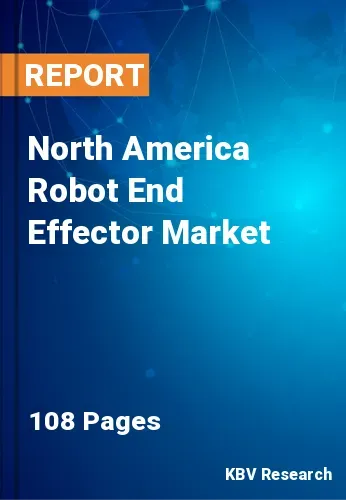The North America Robot End Effector Market would witness market growth of 12.1% CAGR during the forecast period (2022-2028).
The development of collaborative and industrial robot arms has increased, and in recent years, the end-effector evolution has accelerated. This is partly influenced by the necessity for deft manipulation in pick-and-place processes like completing orders for online retailers. The end-effectors of the modern era are evolving into more powerful and sophisticated machine-learning software. The EOAT's ability to conform to its environment through machine vision and safety features is increasingly being coupled.
For instance, automated guided vehicles are replacing conveyors in situations where they deliver bins of mixed items. Robots must be able to respond to users and modify their behavior as they collaborate even more effectively with humans. Therefore, researchers want to recognize fundamental human characteristics in the next years and modify the robots' actions to react to them. This would progress over the subsequent years into considerably more sophisticated systems that could adapt to the demands of complex task requirements.
Government programs are being promoted to facilitate robotics development and increase the need for end effectors. For instance, the U.S. Federal Government launched a program titled the National Robotics Initiative (NRI) to improve domestic robot manufacturing capacity and promote regional research initiatives. In addition, NRI-3.0, a new program from the National Science Foundation (NSF), was announced in February 2021. Numerous federal government departments and organizations, including the National Science Foundation (NSF), the U.S. Department of Agriculture (USDA), the Department of Transportation (DOT), the National Aeronautics and Space Administration (NASA), as well as the National Institute for Occupational Safety and Health (NIOSH), are supporting NRI-3.0 (NIOSH).
The US market dominated the North America Robot End Effector Market by Country in 2021, and would continue to be a dominant market till 2028; thereby, achieving a market value of $836.8 million by 2028. The Canada market is poised to grow at a CAGR of 14.7% during (2022 - 2028). Additionally, The Mexico market would witness a CAGR of 13.7% during (2022 - 2028).
Based on Type, the market is segmented into Grippers, Welding Guns, Tool Changers, Clamps, Suction Cups, and Others. Based on Vertical, the market is segmented into Automotive, Metal & Machinery, Food & Beverage, Electrical & Electronics, Plastic, Rubber, & Chemical, Precision Engineering & Optics, Pharmaceutical & Cosmetics, E-Commerce, and Others. Based on Robot Type, the market is segmented into Traditional Industrial Robots, and Collaborative Industrial Robots. Based on Application, the market is segmented into Handling, Welding, Assembly, Processing, Dispensing, and Others. Based on countries, the market is segmented into U.S., Mexico, Canada, and Rest of North America.
Free Valuable Insights: The Global Robot End Effector Market is Predict to reach $4.2 Billion by 2028, at a CAGR of 12.6%
The market research report covers the analysis of key stake holders of the market. Key companies profiled in the report include ABB Ltd., ATI Industrial Automation, Inc. (Novanta, Inc.), DESTACO, Inc. (Dover Corporation), Kuka AG (Midea Investment Holding Co., Ltd.), Bastian Solutions, LLC (Toyota Advanced Logistics Group) (Toyota Industries Corporation), Piab AB (Patricia Industries) (Investor AB), Robotiq, Inc., SCHUNK GmbH & Co. KG, J. Schmalz GmbH and Zimmer Group.
By Type
By Vertical
By Robot Type
By Application
By Country

Our team of dedicated experts can provide you with attractive expansion opportunities for your business.

